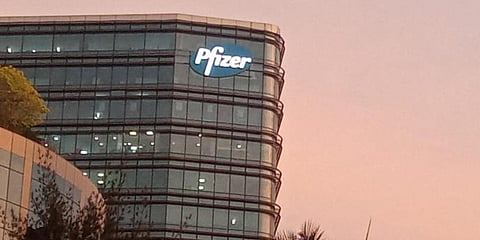

SEOUL: South Korean health officials on Wednesday approved Pfizer's COVID-19 vaccine for children aged 5 to 11, expanding the country's immunisation programme in the face of a massive omicron outbreak that is driving up hospitalisations and deaths.
The Korea Disease Control and Prevention Agency reported a record 171,452 new virus cases on Wednesday, nearly a 40-fold increase from levels in mid-January when omicron first emerged as the country's dominant strain.
The 99 new deaths were the highest daily tally since December 31, when the country was grappling with a delta-driven surge that buckled hospital systems. More than 500 virus patients are now in serious or critical condition, up from around 200 in mid-February.
In a long-awaited announcement, the Ministry of Drug and Food Safety said it approved the Pfizer vaccine as the country's first shot to be used for children aged 5 to 11. The KDCA didn't immediately say when vaccinations for this age group would begin.
The Pfizer shot is already used for children aged 5 to 11 in more than 60 countries, including the United States and in the European Union, the MDFS said in a press release. The vaccine will help protect younger children from infections or serious illness amid South Korea's fast-developing omicron surge, it added.
Teenagers and younger children have been linked to a rising number of infections in recent weeks, according to KDCA data, a worrisome development as schools prepare for new semesters in March. The country had earlier approved vaccinations for people 12 years and older.
As of Wednesday, 86.4 per cent of South Korea's more than 51 million people have been vaccinated and nearly 60 per cent have received booster shots. South Korea was seen as a success story early in the pandemic after it contained infections and hospitalisations more effectively than most countries in the West.
Health authorities worked closely with biotech companies to ramp up laboratory tests and aggressively mobilised technological tools and public workers to trace contacts and enforce quarantines. But officials were accused of prematurely easing social distancing rules ahead of a devastating delta-driven spread in December and early January.
The country's strengths have been further eroded by the highly transmissible omicron variant, which is stretching worn-out health and public workers.
The country has been forced to reshape its pandemic response in a way that effectively tolerates the virus' spread among the broader population while concentrating medical resources to protect high-risk groups, including people 60 years or older and those with pre-existing medical conditions.
Officials have significantly eased quarantine restrictions and reduced contact tracing, while more than 520,000 people with mild or moderate symptoms are currently being treated at home to save hospital space.
The country has also reshaped its testing policy around rapid antigen test kits, despite concerns over their accuracy and propensity for false-negative results, to save laboratory tests mostly for priority groups.
Many South Koreans are wary of the bend-but-not-break approach as the country continues to report some of the world's highest daily infection numbers.
Authorities seem to have limited political capacity to strengthen social distancing ahead of the March presidential election, given people's fatigue and frustration with extended restrictions and the strain on service sector businesses.
Despite the growing outbreak, officials last week extended restaurant dining hours by an hour to 10 pm over economic considerations, although they have so far maintained a six-person limit on private social gatherings. "It would be crucial for us to weather the virus spread while minimising serious illnesses and deaths," Health Ministry official Son Youngrae said during a briefing.
He said that South Korea's COVID-19 hospital capacities had expanded since the delta wave and are now able to handle around 2,000 patients with serious illnesses.